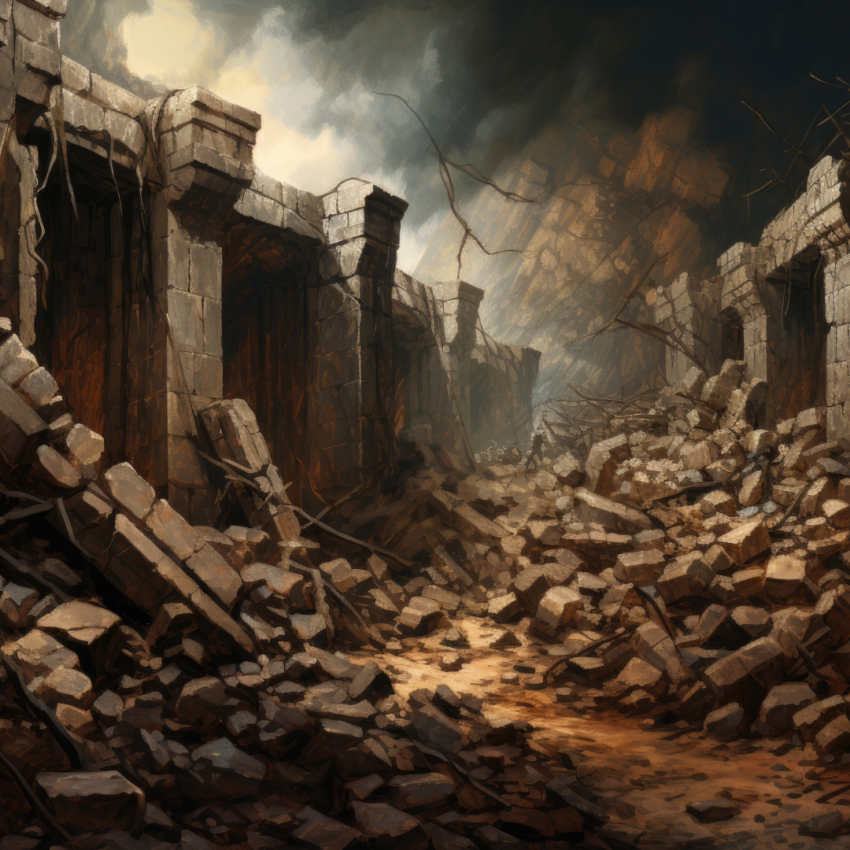The Jericho war, as recorded in the Book of Joshua (chapter six), was perhaps the most unusual battle ever won in human history. The Israelites merely marched around it and sounded trumpets, and Jericho’s walls fell.
Some skeptics may say the Jericho event had never happened.
We visited the ruins a few years ago.
Our guide explained to us. “The meticulous work of Kenyon, an archaeologist, showed that Jericho was heavily fortified and had been burned by fire. A great earthen rampart surrounded the city with a stone retaining wall, about twelve to fifteen feet high, at its base. On top of that was a mud-brick wall, six feet thick and about twenty to twenty-six feet high. The Israelites couldn’t possibly penetrate Jericho’s bastion.”
The guide pointed at a heap of stones. “If the Israelites besieged and attacked Jericho, the wall should plunge toward the city. But archaeology found the wall simply collapsed.”
“Where did Rahab live?” A woman in our group asked. “According to the Bible, she lived in a place on the wall. Did her house collapse?”
“Glad you asked. Evidence from excavations shows some people lived on the embankment between the upper and lower city walls.” Our guide scanned his notes. “The German excavation which took place between 1907 and 1909 found a stretch of the lower city wall on the north didn’t fall. Rahab’s house was likely located there. It makes sense since the spies could have escaped and crossed a short distance to reach the hills of the Judean wilderness.”
I eyed the ruins. “Even if the wall collapsed, how could the Israelites scale such a tall pile of rubble?”
“Another good question.” The guide’s eyes glowed. “Excavations have shown the walls collapsed in such a way as to form a ramp against the retaining wall. The Israelites then climbed up over it into the city. Archaeology discoveries also verified a record in the Bible that the Israelites burned the entire city and everything in it.”
A man in our tour group nodded. “I remember an interesting antidote from the book I’ve read. Archaeologists found storage jars full of charred grain here. Grain was valuable at that time, and the conquerors would have plundered it. The Bible tells us Joshua had commanded the Israelites not to take anything because the city and its contents were to be devoted to the Lord. That explains why charred grain was left in Jericho?”
A skeptic raised his hand. “What caused Jericho’s wall to come down?”
“You guys asked a lot of outstanding questions.” Our guide smiled. “Several theories exist. Archaeologists found evidence of earthquake activity. It was still a miracle since an earthquake happened at precisely the right moment and in such a way as to protect Rahab’s house. The Bible says, ‘By faith, the walls of Jericho fell after the people had marched around them for seven days.’”
Jericho is a wonderful spiritual lesson for Christians. We may face challenges that look impossible to overcome. If we trust in God and follow His commandments, He will perform great and awesome deeds for us.
Dr. Wuwong (PhD in biochemistry, MBA in finance) has published 120+ scientific books and papers (under her legal name) and a few Christian fiction books (Love at the Garden Tomb, The Way We Forgive, Blazing China, and Detour to Agape, under R. F. Whong). She lives in the Midwest with her husband, a retired pastor. They served together at three churches from 1987 to 2020. Her grown son works in a nearby city.
She currently runs a small biotech company (www.vidasym.com) and has raised more than twenty million US dollars during the past few years for Vidasym.
In addition to her weekly newsletter and the platform (www.ruthforchrist.com), she’s active in several writers’ groups, including ACFW, Word Weavers, Facebook, and Goodreads. Through these connections, she plans newsletter/promotion swaps with others and has writers endorse her books, write forewords, and host her on guest blogs.

